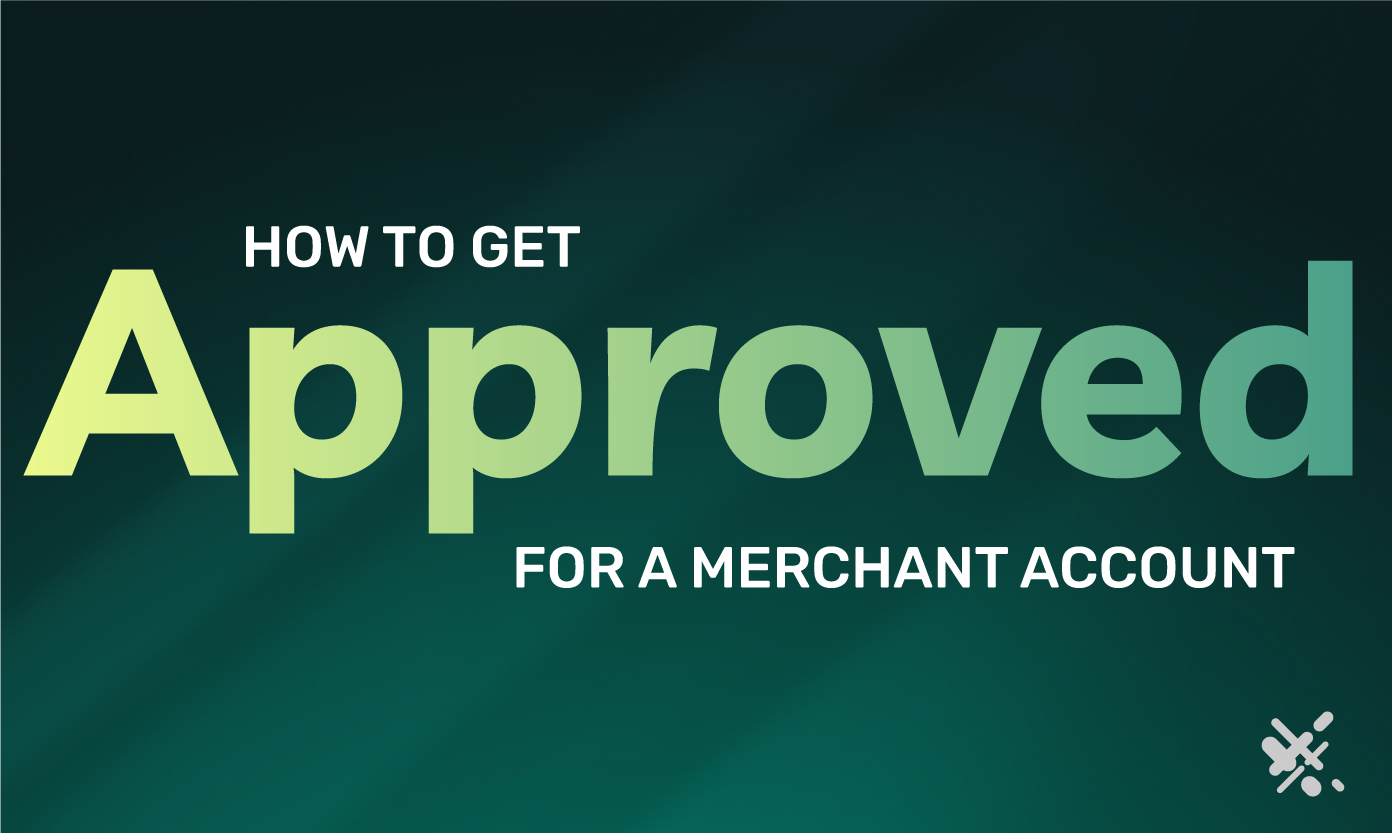So you’ve started a business. Things are taking off. Perhaps you’ve been selling goods on Etsy, eBay, or Shopify. Or maybe you are offering services on a platform like Upwork or Fiverr. Now you’re ready to break free from the confines of your platform and make it on your own. But how exactly are you going to be able to accept credit cards? Or debit cards? Answer: You will need to be approved for a merchant account.
What is a Merchant Account?
You’ve probably seen (in your own experience shopping) that large corporations and small businesses alike have card terminals at the point of sale. Credit card processors manage these debit and credit card processing machines.
These are fintech companies that help a business accept credit cards. Ultimately they help the business collect money from customers and deposit it in the business bank account.
Although there is no physical POS terminal (point of sale terminal) in online shopping, there is a virtual terminal. These also take a variety of payment methods. Credit card processing services also manage a merchant’s online payment gateways.
Just as they do in a physical store, these fintech companies assist in payment processing for their online business customers. A payment processor is also often called a merchant services provider. To clarify further, a merchant account provider may refer to a temporary holding ground for funds before they are deposited in your merchant bank account.
Your merchant bank (the bank that serves your business) may or may not offer payment processing. And a payment processor may also provide a merchant account. Mixing up the terms is easy, so we’ll generally refer to it as payment processing or merchant account services.
And so, now, onto the questions that really matter. How can you get a merchant account for small businesses? And what is the best merchant credit card processing company to partner with? Are there any requirements for getting merchant services? How much does it cost? Are there free merchant accounts?
Free Merchant Accounts… But Not Free Processing
Let’s answer the last question first because it has a lot to do with why you may be looking for merchant services in the first place. Free eCommerce merchant accounts include platforms like Shopify or plugins by the likes of PayPal, Venmo, or Square. They’re free to set up…but they’re not entirely free. Your fees would be around 2.6% + some cents for every transaction.
It doesn’t seem like a bad deal, does it? If your customer’s average shopping cart is around $50 or less, paying a dollar and some change to get a sale doesn’t seem like a bad proposition. But what happens when business really takes off? What happens when you’re selling $1,000 of merchandise a day? Are you okay with giving PayPal $9,500 every year? Suddenly free is not free.
It’s time to look for an online merchant account. Or, if you’re a brick-and-mortar, a merchant services provider can also sell you hardware, like POS terminals. Unlike Shopify, Venmo, and PayPal, however, small business merchant account providers will not just take anyone under their wing.
First things first: merchant account credit card processing companies only work with real businesses. In most states, that means filing articles of incorporation to become a corporation or articles of organization to become an LLC. Side note: for taxation purposes, it probably does help to be structured as a C-corporation.
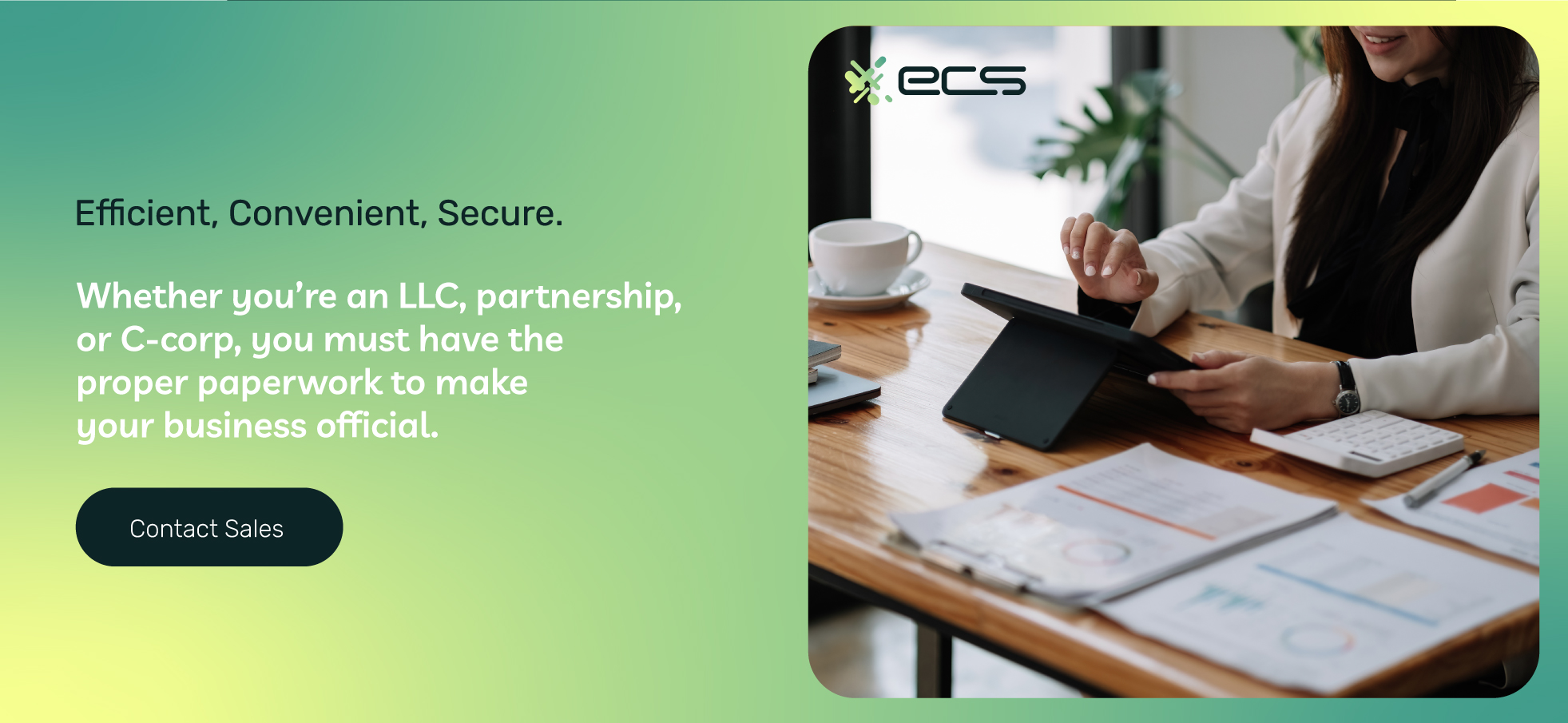
You Will Need the Right Paperwork
Whether you’re an LLC, partnership, or C-corp, you must have the proper paperwork to make your business official. Speak to your local chamber of commerce if you want to know what that is.
Usually, the starting point is getting a separate tax ID or EIN (employer identification number) for your business. This number distinguishes its financial activity from yours and your SSN (social security number).
For certain types of businesses, you will need specific licenses. For example, let’s say you started selling yogurt parfaits to your neighbors through Instagram, taking orders through your DM, and using PayPal or Venmo to get paid.
If you transition to a business officially, you’ll need a restaurant license. You may need some certs from the local board of health. If you sell liquor (Jack Daniels Pirate Parfait, anyone), you’ll need a liquor license. And so on. Again, your local chamber of commerce can answer all these questions.
You Will Need a Business Bank Account
Next, you will need a business bank account. A business bank account is different from a personal checking account, and it’s different from a merchant account. These days, most personal checking accounts have a monthly maintenance fee of $10 to $15 unless you get $500 in monthly deposits or maintain an average daily balance of $1500.
Business bank accounts will have higher monthly account fees or monthly minimums. However, they will also have a greater degree of functionality. For instance, once you obtain a payment services provider, you can receive credit and debit card payments. You will be able to pull ACH payments from customer accounts.
Mainly, a business bank account is for keeping business finances separated from your personal finances. This is the same principle behind having a separate EIN for your business rather than using your personal SSN.
You Will Need to Fill Out An Application
Now it’s time for the merchant account application. Each merchant services provider differs, but the applications will generally ask the same questions. You will be asked to provide your name and contact information, business name, business contact information, and the business EIN. You may also need to answer questions about your sales volume and sales history.
Your potential merchant payment company may ask for specific documents. These could include identification for you—like a passport or driver’s license. They might request a voided business check with your DBA (doing business as) or business name. In some instances, they may require a few months of bank statements.
One part of the application will ask you to describe the nature of your business. Think carefully about this one, and answer honestly. The answer you provide to this question will eventually result in the MCC or Merchant Category Code assigned to your business. Once your business is established with its proper MCC code, you cannot change it.
What is an MCC Code?
A Merchant Category Code describes the primary activity of your business. It’s a four-digit number that card networks and banks assign to merchants. Information about the merchant is often collected when they apply for a payment processor merchant account. An MCC code will be assigned to the business by describing the primary business activities listed on the application.
These codes permit and restrict transactions, award points to consumers using credit cards, and establish interchange rates. For instance, if a business has an MCC code that falls outside the scope of your standard purchasing patterns, your bank may freeze your debit card to prevent (what it thinks is) fraud if it’s tendered there.
If a consumer has a credit card that awards points for travel-related purchases, MCC codes categorize those purchases and award points accordingly. Hotels, airlines, cruise lines, and travel agencies have specific MCCs. Purchases made at such places are rewarded based on the MCC code.
Those are some consumer-facing examples. From the business end, the MCC code establishes how much a transaction will cost to facilitate. Recall that we mentioned the typically 2.6% + change flat fee charged by PayPal and associates. In reality, an extensive variety of fees are based on MCC codes.
As a participant in the payment landscape, you will need an MCC. That starts with your application. If there is some ambiguity about the nature of your business, the payment processor may follow up with additional questions or documentation.
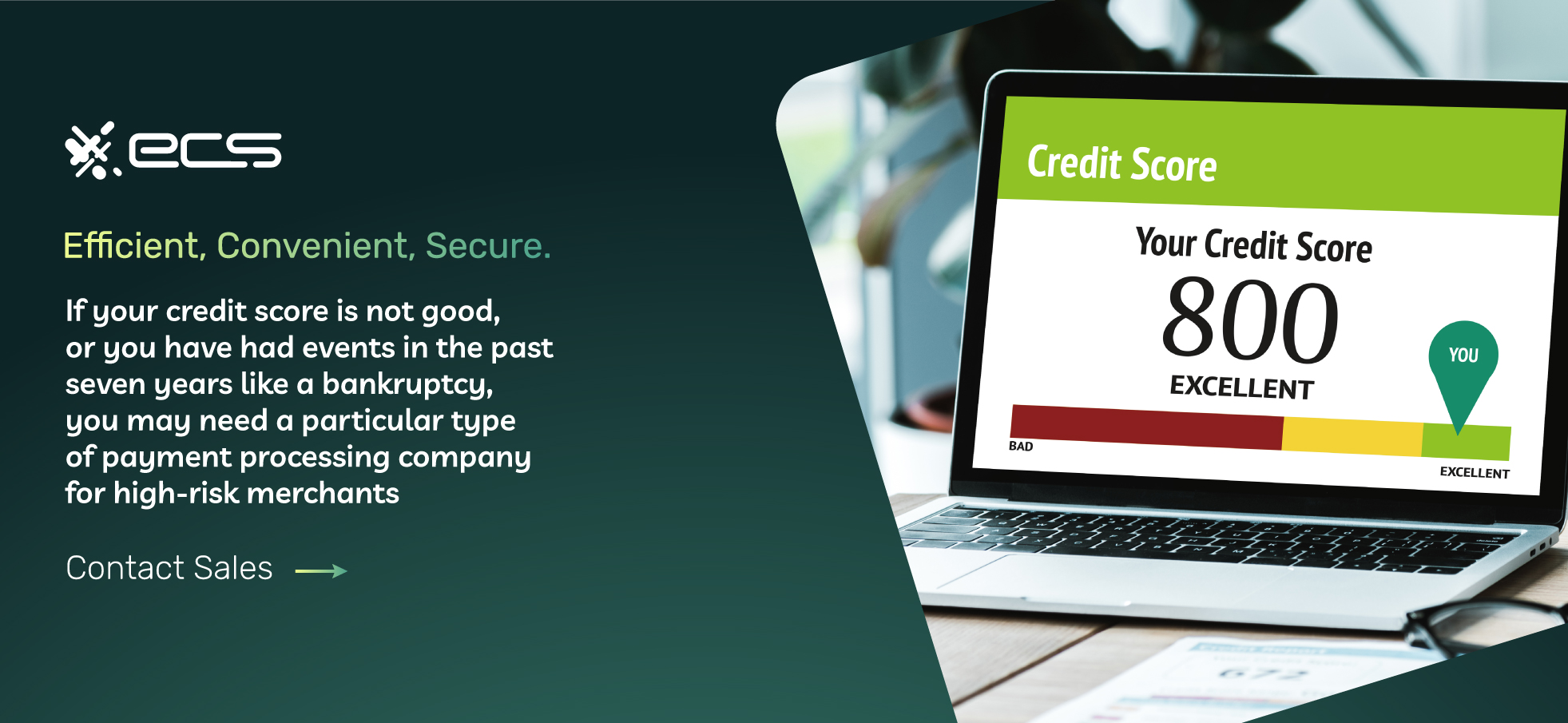
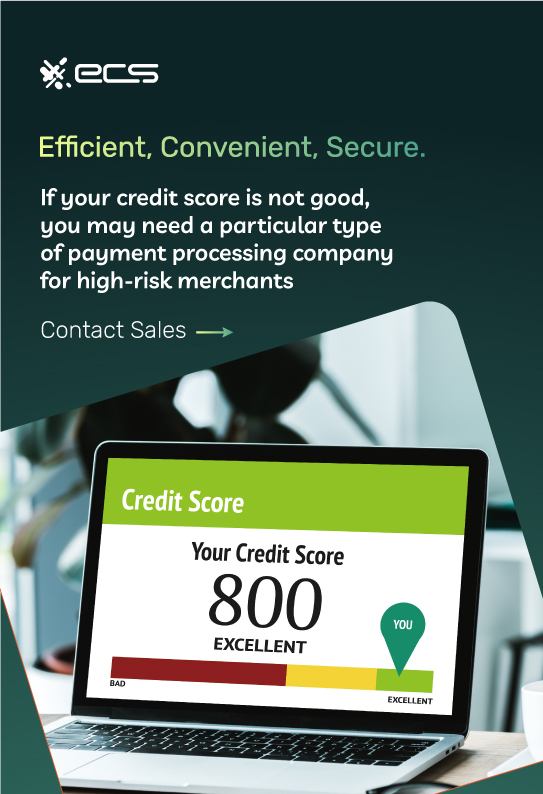
Do You Need Good Credit to Get a Merchant Account?
If your credit score is below 600, you may need a cosigner on your merchant account application. You might be wondering why your credit matters when we’ve spent so much time talking about making your business a separate entity with an EIN and its own bank account.
Corporate credit takes time to build. There are a lot of steps involved, such as getting a DUNS number—a Data Universal Numbering System number issued by the business credit bureau Duns & Bradstreet. There are other ways to build corporate credit, such as getting a business credit card.
Once you have a DUNS number, you can build business credit. Another way to do this is to negotiate Net-30 payment terms with your vendors and pay early as possible. Doing so boosts your Duns & Bradstreet Score as an indicator of your business creditworthiness.
However, this takes time. And for most small businesses, entering the payment landscape with your own MCC and merchant ID number and corporate credit to boot is impossible, or at least very difficult. A better indicator for the payment processor (for better or worse) is your personal credit score.
Personal Credit Vs. Business Credit
You might think you can get around this by getting a business credit card. Surprise! Most business cards also ask for your personal credit score. However, they are a good stepping stone towards establishing business credit.
In any case, the upshot of this particular point is that it’s crucial to have good credit. This is true in your personal life if you want an easy time getting a vehicle loan, credit card, or mortgage. And it’s true if you own a small or midsize business. Financial institutions need a point person to interact with, and it needs to be someone they can trust.
If your credit score is not good, or you have had events in the past seven years like a bankruptcy, you may need a particular type of payment processing company for high-risk merchants. We’ll get to that momentarily. In the meantime, know that applying for merchant services means you cannot hide behind the corporate veil…especially if you’re not an S-corporation.
You Will Need to Pass the Merchant Account Underwriting Process
The underwriting process for merchant accounts on large platforms like Shopify is easy because there isn’t one. Do you sell guns, drugs, or adult escort services? No? You’re approved. Of course, there is a little more nuanced than that.
But by and large, businesses with no established history can start selling on these platforms today. In fact, these businesses don’t even have to be a business on paper. They don’t need a business checking account.
That’s because large payment processing companies are payment aggregators. They bundle all their “customers” under their own merchant ID. When sending payments through the card networks, a customer’s bank does not view you as a separate business.
Instead, they consider themselves doing business with the platform. If you don’t believe us, check your bank statement to see if you’ve ever ordered anything from Etsy, eBay, or Shopify. The name of the individual business is not listed—just the platform.
When you apply for your own payment processor, you are treated as an individual merchant. And in many ways, this is for the best. When a payment aggregator has a problem with a merchant, they bump that account off. They cannot afford to have any bad apples in the bunch tarnishing their good name and reputation.
What Goes Into Underwriting?
But to get your own merchant account with a payment processor, you must pass an underwriting process. Like insurance, underwriting involves the payment processor weighing the pros and cons of taking you on as a customer. They will do their best to analyze the risk and the potential reward.
You cannot control anything about the underwriting process. It’s just something that happens in the shadowy underworld of the payment processor…or (more likely) the fluorescent-lit, drop-tiled, gray-carpeted office spaces of their corporate castle.
Many factors will be considered here, such as your business’s nature, payment history (if applicable), and credit history. Sometimes a payment processor will decide they do not want to work with you. There could be several reasons for this, and they’ll let you know why in their decision.
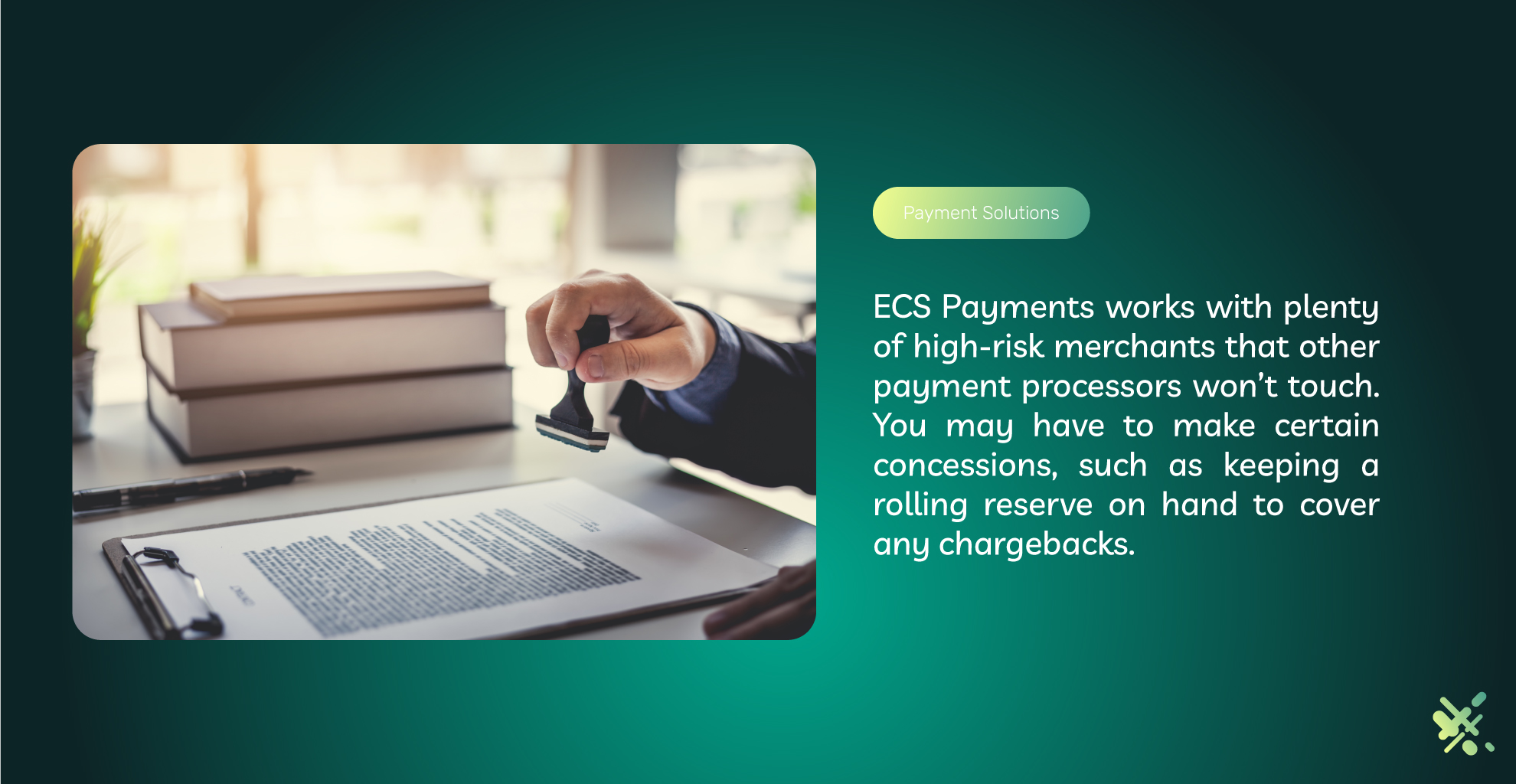
What Happens if I Don’t Get Approved For a Merchant Account?
You’ve filed the business paperwork, got your own bank account, filled out the application, and completed the extra paperwork required by the underwriting team. You’ve also avoided walking under any ladders, letting black cats cross your path, and even hanging some garlic cloves above your front door (in case those underwriters come looking for…more).
Don’t fret if a payment processor does not approve you. As mentioned earlier, this may be because you are inescapably defined as a high-risk business. This may be due to your credit history or disputed charges in the chronicles of your sales.
Alternatively, it may be the nature of your business. You’re a high-risk business if you sell supplements, CBD, guns, or adult entertainment. But you may also be a high-risk business if you are a credit counselor or sell subscription-based software. In some cases, you might have a high volume of sales that exceeds the capacity of a particular payment processor.
Keep calm and carry on. ECS Payments works with plenty of high-risk merchants that other payment processors won’t touch. You may have to make certain concessions, such as keeping a rolling reserve on hand to cover any chargebacks. But over time, as your business proves itself, the rolling reserves will be released back to you.
Why Do Merchant Service Providers Need To Care About All This Stuff?
You might wonder why Square, Stripe, Venmo, and Shopify will welcome any merchant (barring those gun-toting, CBD-selling, adult entertainers) without asking all these questions and requiring official paperwork. That’s because these platforms are not making such an investment.
They’re not giving you a dedicated account manager—just generic (horrible) outsourced customer support. They’re not making any unique pricing structures to cover interchange fees and their cost cut, such as interchange plus or tiered pricing.
They are just slapping you with flat-rate processing fees. They’re not giving you any specialized hardware or tailoring any software to the specific needs of your business.
You Are An Investment
If a payment processor works with you, they will make a significant investment in your business. They do not want to work with a business that will go out of business…which is why they ask about your sales volume, chargeback history, and credit. It’s also why they ask about the nature of your business and decline to work with dangerous or high-risk businesses.
Alternatively, they may still choose to work with your business but mitigate their risk with their pricing model. To reach a deal that works well for you and them, they need to get to know you.
That’s why they need all this documentation and an application. The sad truth is that around 50% of all small businesses don’t make it past five years. A payment processor must know you’re in it to win it.
So if you are in it for the long haul and you’re looking for a payment processor, call or drop us a contact request with the form below. We’d love to hear from you and answer any questions you have about the application process.
Frequently Asked Questions About Getting Approved For a Merchant Account
The underwriting process plays a crucial role in merchant account approval. You must consider your business model, payment, and credit history. Once you have all your business documentation in order and you’ve selected your desired payment provider, you will need to fill out a merchant application. If you have questions about the application process or need a new merchant account provider, ECS Payments is happy to help.
Good credit plays a significant role when applying for a merchant account. If your credit score is below 600, you may need a cosigner on your application. You may also be considered for a high-risk merchant account. However, ECS is happy to provide high-risk and traditional accounts to merchants. Contact ECS Payments for your merchant account today.
If traditional payment processors do not approve you, it might be due to your business’s credit history, industry, or being categorized as high-risk. ECS Payments specializes in working with high-risk merchants and can help you find a solution even if other processors have declined you.
Payment processors invest in the businesses that they work with. They want to ensure they are partnering with reliable and legitimate businesses. The documentation helps to assess the risks and potential rewards of working with your business. ECS Payments is dedicated to helping businesses navigate the application process and provide guidance to ensure success.
